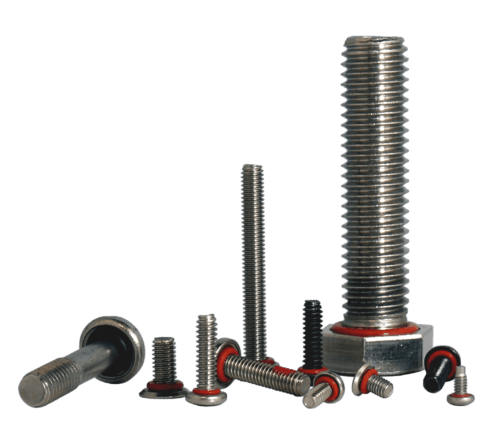Guide to Sealing Fasteners
Fasteners such as screws, bolts, nuts, and nails provide connections for critical components and disparate substrates across industries. Sealing fasteners go a step further by tightly sealing against the substrate, making them particularly for high-value and high-intensity situations. Today, we want to take a closer look at sealing fasteners – what they are, how they work, and why they’re so crucial.
 What are Sealing Fasteners?
What are Sealing Fasteners?
A sealing fastener features an elastomer molded or built into the hardware, eliminating the need for messy pastes or liquid sealants. The built-in O-ring is often made of silicone or rubber, but manufacturers sometimes use other materials like nitrile, neoprene, or EPDM. The purpose of the O-ring is to provide a tight hermetic seal once the fastener is installed.
As an operator applies torque to tighten the fastener, the O-ring expands to fill in any gaps between the fastener and the surface. Numerous highly specialized sealing fasteners exist, including nuts, bolts, screws, and washers, among others.
Sealing Fastener Capabilities
A sealing fastener creates a much tighter seal than what is possible with a standard fastener. This seal prevents contaminants like dust, oil, or other liquids from seeping in or out. This capability makes sealing fasteners ideal for sterile environments and operations containing toxic materials and pollution.
The O-ring also provides a better grip for the fastener, ensuring that it doesn’t come loose over time. A quality sealing fastener holds true even in high-pressure settings, such as deep underwater or within heavy machinery pressure valves. Overall, a good sealing fastener should feature good resistances to chemicals, water, temperature shifts, and vibrations, which makes them far superior to traditional fastening hardware.
Benefits of Using Sealing Fasteners
Sealing fasteners offer an array of advantages, such as:
- Corrosion resistance Sealing fasteners get made from corrosion-resistant materials, such as stainless or zinc-coated steel.
- Durability. The elastomers used to create sealing fasteners won’t break down over time. These fasteners can withstand extreme temperature conditions, ozone, and other harsh environmental factors without becoming brittle or losing integrity.
- Versatility. Because sealing fasteners protect against the intrusion of moisture and contaminants, they tend to work well in a wide array of commercial, industrial, and consumer applications.
- Saving time. The self-sealing capabilities of sealing fasteners simplify the installation process and help installers to save time.
- Lower cost of ownership. Sealing fasteners can typically be removed and reused, making them ideal for temporary projects. They also last longer in permanent installations, minimizing maintenance and replacement costs.
Applications for Sealing Fasteners
Numerous industries benefit from self-sealing fasteners, including:
- Aerospace
- Agriculture
- Construction
- Defense
- Electronics
- Food and beverage
- Industrial
- Infrastructure
- Lighting
- Marine
- Medical
- Power generation
Sealing Fasteners From APM Hexseal
APM Hexseal offers a broad portfolio of self-sealing fasteners in all standard sizes and up to M90 for large infrastructure projects. Our product portfolio includes our patented Seelnuts, Seelskrews, and Seelbolts, which all feature built-in, self-locking seals applied using our proprietary molding process. Our fasteners have a shelf life of over 25 years, making them safe to buy in bulk for large projects.
Need fasteners quickly? Check out our quick quote request to get an immediate estimate for your project or job site. Not sure what kind of fasteners you need? Ask the Experts for help finding the right sealing fastener solution for your specific needs.
Ever Better.

